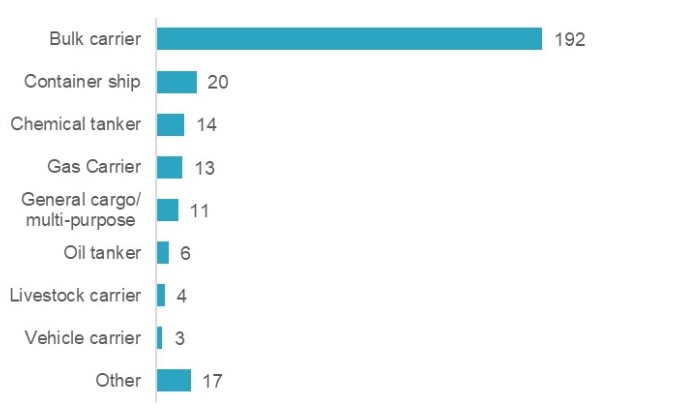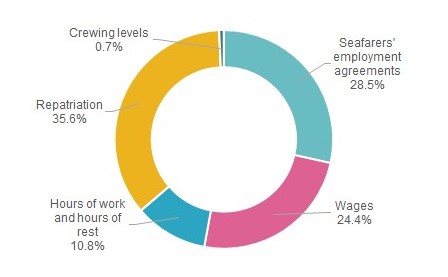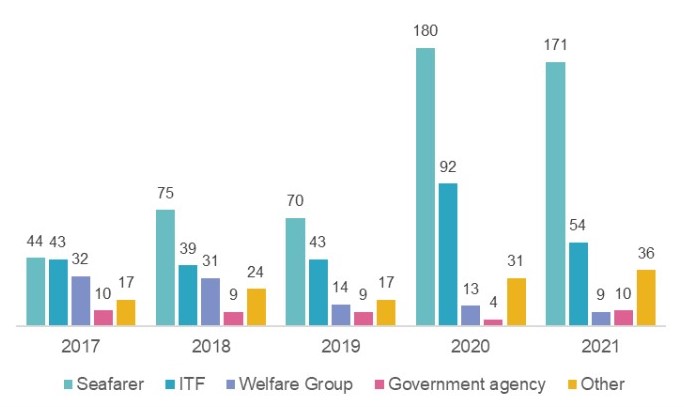In the 2021 Australian Maritime Labour Convention, 2006 (MLC) annual report, AMSA presents an analysis of MLC complaints, compliance and follow-up actions undertaken by AMSA in Australia for 2021.
Similar to 2020, 2021 continued to be a challenging year for seafarers due to the ongoing COVID-19 pandemic. AMSA continues to take a pragmatic approach to MLC compliance in accordance with all Tokyo MOU port State control (PSC) administrations.
MLC complaints received
In 2021, AMSA received 280 complaints. AMSA received a higher number of complaints in 2020, which was double the number received in 2019. These complaints directly related to the consequences of the COVID-19 pandemic.
However there has been a drop in complaints in 2021, as the industry and operators gradually adjusted to the pandemic, but it remains high in comparison to pre-COVID times.
Follow up investigations of MLC complaints resulted in 52 vessels being issued with MLC-related deficiencies, seven of which were detained. This represents a drop of 34% in deficiencies issued and 56 per cent fewer vessel detentions compared to 2020.
In 2021, 68.9% of complaints received were from seafarers engaged on bulk carriers. This remains consistent over the past five years.
Western Australia (38.3%) and Queensland (23.9%) represent the highest number of complaints – noting also that Western Australia represents the majority (34.1%) of vessel arrivals in Australia.

Complaints received by MLC titles
The main body of the MLC is grouped into five main titles with data coded accordingly:
- Title 1 – Minimum requirements for seafarers to work on vessels
- Title 2 – Conditions of employment
- Title 3 – Accommodation, recreational facilities, food and catering
- Title 4 – Health Protection, medical care, welfare, and social security protection (including bullying and harassment)
- Title 5 – Compliance and enforcement
The majority (60%) of complaints were related to Title 2 of the MLC – Conditions of employment. This includes seafarer employment agreements, wages, hours of work and rest, entitlement to leave, repatriation, seafarer compensation, crewing levels and career development. Repatriation complaints resulting from the COVID-19 restrictions are captured under this title.
Moreover, in 2021, there was a significant drop in Title 2 complaints in comparison with 2020. This is an indication that AMSA’s response to repatriation complaints is working.
Of Title 2 complaints, the highest number of complaints received related to repatriation and seafarer employment agreements (35.6 per cent and 28.5 per cent respectively).
This is likely due to the ongoing challenges faced by seafarers during the COVID-19 pandemic regarding the time served onboard and the difficulties faced with repatriation, says AMSA. Wages have consistently made up the majority of complaints from 2017-2020 with the number of wage complaints remaining high in 2021.

COVID-19 pandemic repatriation challenges
Between July 2020 and December 2021, the number of complaints related to repatriation declined significantly, which is a clear indication that AMSA’s approach of getting seafarers home to their loved ones for respite, improved the welfare of those serving at sea.
Complaints follow-up
AMSA endeavours to investigate all MLC complaints—and has done so—except in cases where the vessel was out of area and has not arrived in Australia.
In those situations, AMSA places alerts on the vessel to ensure the complaint is investigated when the vessel next arrives in Australia and may refer the complaint to the flag State of the vessel or port State of the vessel’s next arrival. In all cases we try to ensure the confidentiality of the complainant will be maintained.
The number of complaints originating directly from seafarers has increased across the years, reaching 60% in 2021.
This is likely an indication of the increased awareness of seafarers’ rights under the MLC and the knowledge that Australia takes seafarer welfare seriously. Seafarers are therefore more confident that their concerns are taken seriously and treated confidentially when in Australia
AMSA believes.
Additionally, AMSA has a zero-tolerance approach to breaches under the MLC. Since 2017, a total of 19 vessels have been issued a direction notice under the Navigation Act 2012 refusing them access to Australian ports.
Of those 19 vessels, 15 (79%) were banned for serious breaches in relation to MLC for reasons that primarily include underpayment of wages and decent working and living conditions.
In 2021, three vessels were banned from Australian ports due to MLC breaches. The reasons for the bans range from underpayment of wages, poor working and living conditions, inadequate provisions, inadequate hours of work and rest and falsified records of work and rest.
These were banned for a period of six to thirty-six months. An estimated total amount of AUD $175,000 in wages was recovered from vessels in 2021.

Conclusion
2021 continued to be a challenging year for seafarers due to the COVID-19 pandemic. The pandemic remains an ongoing health crisis with focus now diverted to ensure seafarers worldwide are fully vaccinated.
The total number of MLC complaints received in 2021 represents a 12.5% decrease from those received in 2020, as the industry and operators gradually adjusted to the pandemic, but it remains high in comparison to pre-COVID times.






























































